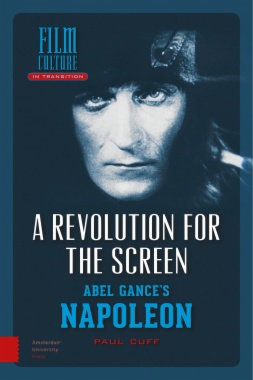Abel Gance's silent masterpiece, Napoleon, was given a limited run on its debut in 1927, but soon afterwards distributors in France and America, unwilling to deal with its nine-hour running time, subjected it to savage cuts - with devastating results for the movie and for film history. The struggle across ensuing decades to restore and reintegrate Gance's film has formed a backdrop to an array of formal, contextual, and ideological battles. In this book, Paul Cuff takes account of those battles and challenges received opinion on Gance's view of both his film and its subject.
- Cover
- Table of contents
- Acknowledgements
- Foreword
- Preface: Critical perspective
- 1. Napoleonic ambition and historical imagination
- 1.1 Introduction
- 1.2 Messiahs of the nineteenth century
- 1.3 Towards a new era
- 1.4 Cinema and the Napoleonic project
- 1.5 Historiography as ritual
- 1.6 Summary
- 2. Shaping expectations: The young Napoléon Bonaparte
- 2.1 Introduction
- 2.2 Cinema as experiential art
- 2.3 Multiplying perspective
- 2.4 Father to the man
- 2.5 Invoking the future
- 2.6 Iconic isolation
- 2.7 Summary
- 3. Civilization and savagery: Visions of the French Revolution
- 3.1 Introduction
- 3.2 Reasoning with chaos
- 3.3 Community and spectatorship
- 3.4 Fire and phoenix
- 3.5 Summary
- 4. Mortal gods: Voices of power and of providence
- 4.1 Introduction
- 4.2 Communicating authority
- 4.3 Chaos and providence
- 4.4 Orchestrating murder
- 4.5 The rhetoric of the Terror
- 4.6 Summary
- 5. The dark light of Napoleonic cinema
- 5.1 Introduction
- 5.2 ‘Bonaparte’ and ‘Napoléon’
- 5.3 Visual antitheses
- 5.4 Inheritance
- 5.5 The expansion of visual language
- 5.6 Summary
- 6. A view from the margins of history
- 6.1 Introduction
- 6.2 Oblivion and remembrance
- 6.3 Parallel lives
- 6.4 Documentation and survival
- 6.5 Forlorn recognition
- 6.6 Summary
- 7. Melodrama and the formulations of family
- 7.1 Introduction
- 7.2 Incomplete families
- 7.3 Fate and fortune
- 7.4 Flirtation and observation
- 7.5 Negotiating the future
- 7.6 Love and war
- 7.7 Summary
- 8. Worlds in transition: Class, consumption, corruption
- 8.1 Introduction
- 8.2 Corrupting powers
- 8.3 New femininities
- 8.4 The Victims’ Ball
- 8.5 Summary
- 9. Death and transfiguration
- 9.1 Introduction
- 9.2 From history to legend
- 9.3 From individualism to universalism
- 9.4 Summary
- Conclusion: The case for enthusiasm
- Filmography and bibliography
- Index
- List of illustrations
- Note on formatting

